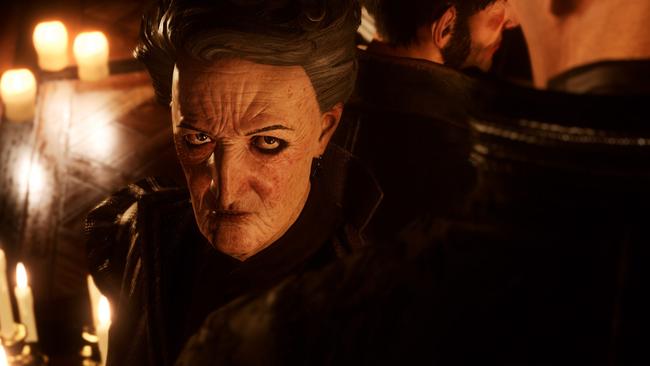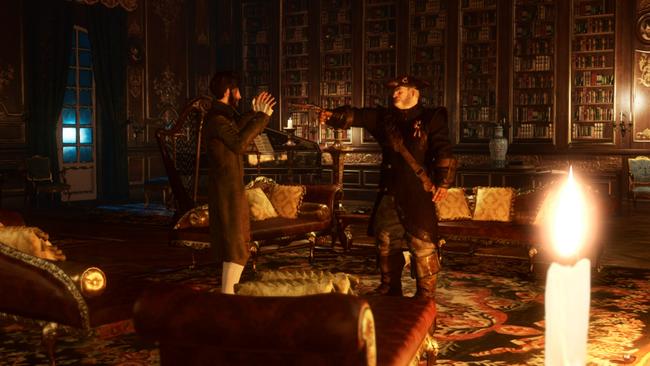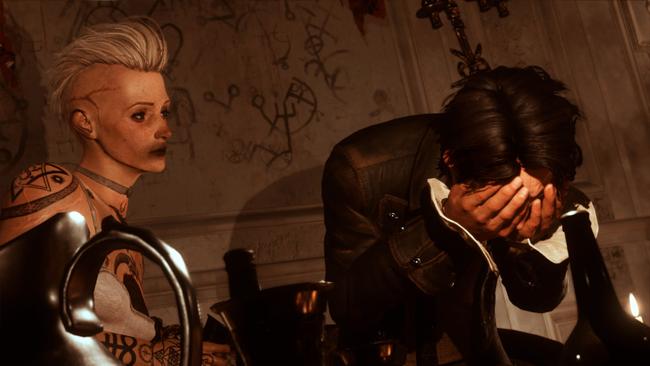
The Council: Episode 1 - The Mad Ones Review
France, Paris. December 10th, 1792. It all starts with a backhanded slap. Captured and sat with their backs to one another, we first witness that Louis de Richet and his mother are being tortured in a misguided effort to make them reveal where they have hidden a stolen book - the fictional grimoire, Al Azif. With plans for it to be sold at one of Lord Mortimer's lavish receptions, Gerard von Borchert wants it back so that he can make a pretty penny.
It is in this opening prologue to The Council: Episode 1 - The Mad Ones that you are confronted with your first hard-hitting choice. After he manages to loosen his constraints undetected, you must decide whether Louis will catch Gerard off guard by rushing to attack him or if he will let his mother momentarily distract him. One choice results in Gerard being knocked unconscious to be questioned later, while the other sees him shot dead and Louis permanently scarred with a deep gash across his face from a nervous knife swipe.
Events fast forward a month, and we see Louis arriving on Lord Mortimer's private island off the coast of England. Ditched in Paris, his mother had continued to investigate the case surrounding Gerard alone. You see, Louis and his mother belong to a secret society called The Golden Order. But, the problem is that she has now gone missing and you have been invited to investigate her disappearance.

In this episodic narrative adventure game, developer Big Bad Wolf Studio has wanted to deliver a fresh take on the adventure game genre. You learn right from the prologue that your actions will have permanent consequences, and while it is unclear at the moment how far-reaching an impact your choices will have, the decisions that you must make feel meaningful enough to readily engage you in the game's story as it unfolds.
You will soon discover that Lord Mortimer's island is the place to be, with the developer having woven their own alternate history in which illustrious personalities like George Washington, Napoleon Bonaparte, and Johann Christoph von Woellner have been brought together for one of the most grandiose receptions imaginable. Each character carries their own dark secrets and hidden agendas - even Louis, who is susceptible to indecipherable visions that you will have the chance to explore.
What really sets The Council apart are the light RPG mechanics that underpin the whole experience. Soon after you arrive on the island, you will have to choose whether Louis is a diplomat, occultist or detective. This class selection will define your basic skillset, but, as you earn experience and level up, you will still have access to skills attributed to the other classes. These are an important aspect of your character growth, not only opening up new dialogue options but can let you kick open doors or lockpick chests to retrieve their contents.

If you choose to use a skill to redirect a conversation or perform an action, it will consume Effort Points. Increase the skill's level over time and it will cost fewer Effort Points to use. This gameplay mechanic seemed smart at first, as the limitation made me fret over my choices and whether or not I should choose to expend my points. But, soon enough, you will pick up a consumable Royal Jelly that restores two points. There's so much jelly left lying around Lord Mortimer's manor that the whole concept started to feel completely unnecessary.
Each character that you meet on the island also has their own personality, making them vulnerable and immune to certain skills. You can expose these through your interactions with both them and other guests, and your gathered knowledge must be taken into consideration when in Confrontations. These are short conversations in which you must be as persuasive as possible, with your success or failure in their several steps having a direct impact on elements in the game's story. You are allowed to make blunders, but you are encouraged to end the Confrontation with a positive answer.
Other consumable items come in Devil's Thorn that lets you temporarily see immunities and vulnerabilities in a conversation, Carmelite Water that will allow you to use your next skill without needing Effort Points, and the Golden Elixir that will remove any negative statuses such as intoxication that will hide the dialogue timer until cured. There are also Amber Fragments that you can accumulate - collecting four increasing the maximum Effort Points that you can have at any time by one.

The episode is broken down into separate chapters, or quests as the developer has chosen to refer to them. Their completion will reward you with experience based on the choices that you have made, character traits revealed, vulnerabilities exploited and items found, which, in turn, will reward you with the chance to level up your skills. You will also be told what opportunities you have missed, in case you want to replay a quest to explore the path that a different decision will see you tread. And, for bonus skill points, you can also select a manuscript that you have collected for Louis to miraculously read in the background.
While the narrative is riddled with intrigue and the gameplay mechanics help to keep you invested in seeing how this episodic adventure will play out, the execution can frequently miss the mark. That largely comes from poor facial animations that leave you with the unsettling impression that the characters are dead behind the eyes, which isn't helped by their stilted movement in each and every scene. Nor does the voice acting, with performances ranging from the exceptional to the mediocrely wooden.
More than enough new ideas have been thrown at The Council to make it stand out from the crowd, and, while flaws are clearly evident in the three hours that you will spend with this first episode, it makes for a promising start for what is left to come. Technical issues detract from the grandeur of its setting, but it's hard not to be swept up in the mystery that surrounds it all.